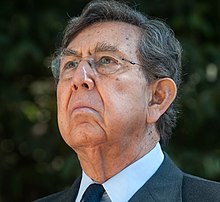Cuauhtémoc Cárdenas Solórzano
| Cuauhtémoc Cárdenas | |
|---|---|
 |
|
| Head of Government of Mexico City | |
|
In office 5 December 1997 – 28 September 1999 |
|
| Preceded by | Position established |
| Succeeded by | Rosario Robles |
| National President of PRD | |
|
In office 1989–1993 |
|
| Succeeded by | Roberto Robles Garnica |
| Governor of Michoacán | |
|
In office 15 September 1980 – 14 September 1986 |
|
| Preceded by | Carlos Torres Manzo |
| Succeeded by | Luis Martínez Villicaña |
| Senator of the Republic of Mexico | |
|
In office 1 September 1976 – 15 September 1980 |
|
| Preceded by | Norberto Mora Plancarte |
| Succeeded by | Antonio Martínez Báez |
| Constituency | Michoacán |
| Personal details | |
| Born |
1 May 1934 Mexico City, Mexico |
| Political party |
PRI (Before 1989) PRD (1989-2014) Independent (2014-present) |
| Spouse(s) | Celeste Batel |
| Children | Cuauhtémoc, Camila and Lazaro Cardenas Batel |
| Alma mater |
Colegio Williams National Autonomous University of Mexico |
| Profession | Civil Engineer Politician |
Cuauhtémoc Cárdenas Solórzano (Spanish pronunciation: [kwauˈtemok ˈkarðenas]; born May 1, 1934) is a prominent Mexican politician. He was a former Head of Government of the Federal District and a founder of the Party of the Democratic Revolution (PRD). He ran for the presidency of Mexico three times. His 1988 loss to the Institutional Revolutionary Party candidate by the narrowest of margins had long been considered a direct result of obvious electoral fraud, later acknowledged by President Miguel de la Madrid. He previously served as a Senator, having been elected in 1976 to represent the state of Michoacán and also as the Governor of Michoacán between 1980-1986.
He was born in Mexico City, on May Day the year his father became president of Mexico and named for the last Aztec emperor. He is the only son of President Lázaro Cárdenas del Río and Amalia Solórzano. He studied at Colegio Williams, an all-boys private, secular English-language school that has a rigorous academic curriculum. The school is located in the old mansion of Porfirio Díaz's finance minister, José Yves Limantour. An alumnus described the education there as cultivating "the body as a source of energy and fighting. It was an energy destined to produce active, intelligent animals of prey. [The school] worshiped manly virtues like tenancity, strength, loyalty and aggression."
...
Wikipedia
